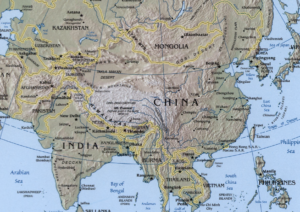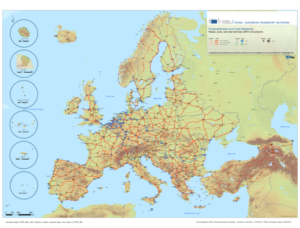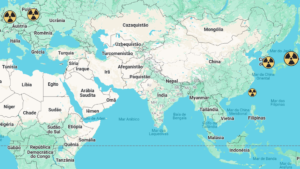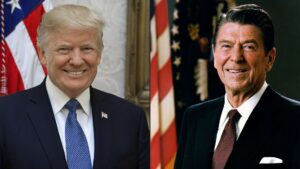In a historic agreement, the nations that make up the G7 group (the world’s most advanced economies) have agreed to make multinational companies pay more taxes by reducing incentives for “extreme tax optimization.”
Finance ministers meeting in London agreed to combat extreme tax optimization by making companies pay in the countries where they do business rather than in tax havens where they typically transfer profits in the form of royalty payments to their subsidiaries in those countries.

Source: Wikipedia
They also agreed in principle to a global minimum corporate tax rate of 15% to prevent countries from hurting each other.
Technology giants like Amazon and Google may be among the companies most affected.
For example, it was reported this week that an Irish subsidiary of Microsoft paid zero corporation tax on profits of $315 billion (£222 billion) last year because it was resident in Bermuda for tax purposes.
The deal announced on Saturday, June 5, 2021, between the US, UK, France, Germany, Canada, Italy and Japan, plus the European Union, could generate billions of dollars in tax revenue for governments to pay off debts incurred during the Covid crisis.
Difference between tax evasion and tax/tax optimization or tax avoidance
Tax evasion occurs when an individual or corporation reduces or hides the amount of income that should be reported to the tax authorities in order to pay less tax (or even none at all). Another way of doing this is by adding fraudulent expenses to reduce the amount of taxed income. Tax evasion is generally considered a crime.
Tax avoidance, on the other hand, is planning using legal methods to reduce the tax burden on a given budget. Also known as extreme tax optimization, it is commonly used by large multinationals using another tax jurisdiction or country to pay less tax.
Unlike tax evasion, tax avoidance is not considered a crime, although it can sometimes be viewed as unethical, depending on how that avoidance is carried out.
For example, the problem that the new G7 guideline attempts to address is called “extreme tax avoidance” or “aggressive tax planning,” which is when an individual or company uses “loopholes” in the international tax system or a mismatch between two tax jurisdictions (countries, overseas territories, states, and others) to minimize their taxes in a way that goes against the “spirit” of the law.
One example of extreme tax optimization is the fact that 60 of the most profitable Fortune 500 companies in the United States paid no taxes (or very little) on a total of $79 billion in profits earned in 2018.
What are tax havens?
While there is no consensus on the exact definition of tax havens, most academics
and governments classify tax havens as tax jurisdictions (cities, states, countries, or overseas territories with their own tax regulations) that have small or no effective tax rates. In addition, tax havens often offer secrecy to individuals and corporations who use them as destinations for financial flows and investments to evade on the “lion.”
There is no general agreement on the definition of a tax haven, nor is there a generally agreed upon list of tax havens. However, some overseas territories, such as the Bahamas, Bermuda, the Cayman Islands, Switzerland, and the US state of Delaware, tend to be included in the better-known lists of tax havens.
It is important to note that while tax havens generally play a central role in extreme tax avoidance and tax evasion schemes, these tax maneuvers can also occur without the involvement of tax havens.
Tax War / Harmful Tax Competition / Race to the Bottom (Tax)
The global minimum corporate tax rate of 15% is intended to prevent countries from continuing a “race to the bottom” in terms of corporate tax rates.
This is also called harmful tax competition, or tax war, which occurs when different tax jurisdictions compete with each other by reducing their tax rates or changing their tax code to attract corporate or private investment.
A current event that was seen by many as a classic example of harmful tax competition was Amazon’s decisions to open a competition between American cities to see which would offer them more tax incentives to attract their investment in a second headquarters.
This practice is also common among countries that compete with each other for Foreign Direct Investments (FDIs). Moreover, this type of tax competition is commonly referred to as “beggar-thy-neighbor” policies.
According to Grabiel Zucman, because of this tax war, the global average corporate tax rate has fallen from 49 percent in 1985 to 24 percent in 2018. When this occurs, this decrease in corporate tax revenue has to be offset by increasing taxes in other areas or on other audiences, such as the middle class.
Why is this tax deal to avoid extreme tax optimization important for the world economy? Why do the world’s richest nations want to change the rules of international taxation?
Governments have long faced the challenge of taxing global companies that operate in many countries.
This challenge has grown with the boom of large technology corporations like Amazon and Facebook.
At the moment, large multinational companies can open local subsidiaries in countries with relatively low corporate tax rates and declare profits in those countries.
This means that they only pay the local tax rate, even if the profits mainly come from sales made in other countries like Brazil, Germany, Russia, France, etc. This is legal and commonly done.
The G7 agreement aims to prevent this in two ways:
First, the G7 will aim to make companies pay more taxes in the countries where they sell their products or services, not where they end up reporting their profits.
Second, the G7 countries want a global minimum tax rate to prevent countries from hurting themselves by competing against each other with lower and lower tax rates.
The two pillars of the agreement aim to combat tax havens by reducing the incentives for multinational companies to “relocate” abroad when they set up subsidiaries in these havens to pay less tax.
This global minimum tax will help the global economy prosper by leveling the playing field for business and encouraging countries to compete on a positive basis to attract business, not just by reducing taxes to attract investment.
With this new revenue, countries will be able to pay off the debt incurred during the Covid pandemic and be better prepared for other emergencies.
In addition, this new tax revenue from multinationals to lead to a reduced tax burden for the middle class who will have more money in their pockets to invest and spend, thus encouraging the economy to grow.
How would the G7 agreement for minimum international taxation work?
The rules about forcing multinationals to pay taxes where they operate – known as “pillar one” of the agreement – would apply to global companies with at least a 10% profit margin.
Twenty percent of any profit above that would be reallocated and taxed in the countries where they operate.
In the case of the UK, for example, more tax revenue would be raised from large multinationals and would help pay for public services.
The second “pillar” of the agreement commits states to a minimum global corporate tax rate of 15 percent to prevent countries from harming themselves by competing with each other.
Why is this G7 international tax agreement happening now?
It is hard to say for sure why this agreement has only been established now. One possible reason would be the fear of global anti-elitist sentiment that has been growing almost everywhere in the world and has manifested itself in the form of the growth of right-wing and left-wing populism in the world’s largest economies.
According to many academics, this anti-elitism has been growing in recent years due to global economic crises that have led to a shift in public opinion regarding the “fairness of the system” as a whole, questioning whether the system was not rigged to only benefit the global economic elite and not the middle class as a whole.
The great financial crisis of 2008 was a crisis that originated in the United States and, according to most experts, was a consequence of abundant credit expansion by the American government and banks, coupled with reckless and sometimes fraudulent lending by banks.
These actions led to a bubble in the American housing market that eventually burst when people and companies began to default on their debts in cascades. This ended up affecting the financial markets and the “real” economy all over the world.
Also, since several international banks owned some of these real estate debt obligations, they too were affected by the non-payment of these obligations. This ended up infecting the banking systems of several countries, especially within the European Union.
The European Union’s debt crisis was a direct consequence of the 2008 financial crisis and the problem of highly indebted countries that began to have difficulty refinancing their sovereign debts from the beginning of the crisis. In order to reduce their budget deficits and regain the confidence of international markets, some EU countries imposed austerity measures to reduce their national budgets.
However, some of these austerity measures hit the middle classes in these countries the hardest, thus fomenting animosity against those who seemed to have been unaffected by (or even profited from) the crisis.
Specifically, there was the perception that these individuals were evading taxes or using subterfuge to avoid paying their fair share of taxes.
Since then, there has been a rise in populism and “ante-establishment / globalization,” which some academics perceive as consequences of these same two crises.
The Brexit (Britain’s exit from the European Union), the election of Trump, the successful campaign of Bernie Sanders (American Social Democratic candidate), and the “yellow vests” in France, and even the invasion of the U.S. Capitol on January 6, 2021, were seen as “peaceful revolutions” against the elite.
These events have played a key role in pressuring national governments to act and cooperate at the international level to force the richest multinationals in the world to pay more tax and contribute more fairly to the society from which they profit so much.
The fact that American president Joe Biden is more inclined toward multilateralism and global cooperation to solve world problems also helped seal the deal.
Now, this agreement will be discussed with the G20, the group of the 20 largest economies in the world, which includes countries such as Brazil, China, Russia, and others.
Does aggressive fiscal optimization happen in Brazil?
The short answer is yes! One of the most famous cases of aggressive tax optimization is the case of mining company Vale, accused of using subsidiaries in Switzerland and the Cayman Islands to pay less tax on ore exports.
Vale allegedly took advantage of loopholes in the Brazilian legal system to evade more than 23 billion reais in taxes on iron ore exports between 2009 and 2015, according to a report by the IJF (Institute for Fiscal Justice), an organization made up of economists and auditors from the Internal Revenue Service.
The mining giant initially exported the product to its Swiss office at a below-market price and then sold it to Asian countries at the correct price, according to the report.
The report also highlighted Vale and BHP Group joint venture Samarco Mineração SA, as well as Usinas Siderúrgicas de Minas Gerais SA and Gerdau SA as examples of mining companies operating in Brazil that have entities in tax havens such as the Cayman Islands, the British Virgin Islands, and Luxembourg.
Assignment to the featured image












[…] a joint statement in the English city of Cornwall, the G7 leaders said they would offer a partnership “guided by values of high standards and […]
[…] Euro, which will one day be the official currency of the entire union, still suffers from a lack of fiscal union within the European Union. Although, the joint issuance of debt by the European Union (European Central Bank) representing […]
[…] billionaires are not accused of illegal activities. But the fees expose the flaws and loopholes in U.S. tax laws in not collecting increases in wealth derived from increased assets, but in the form of taxation on […]